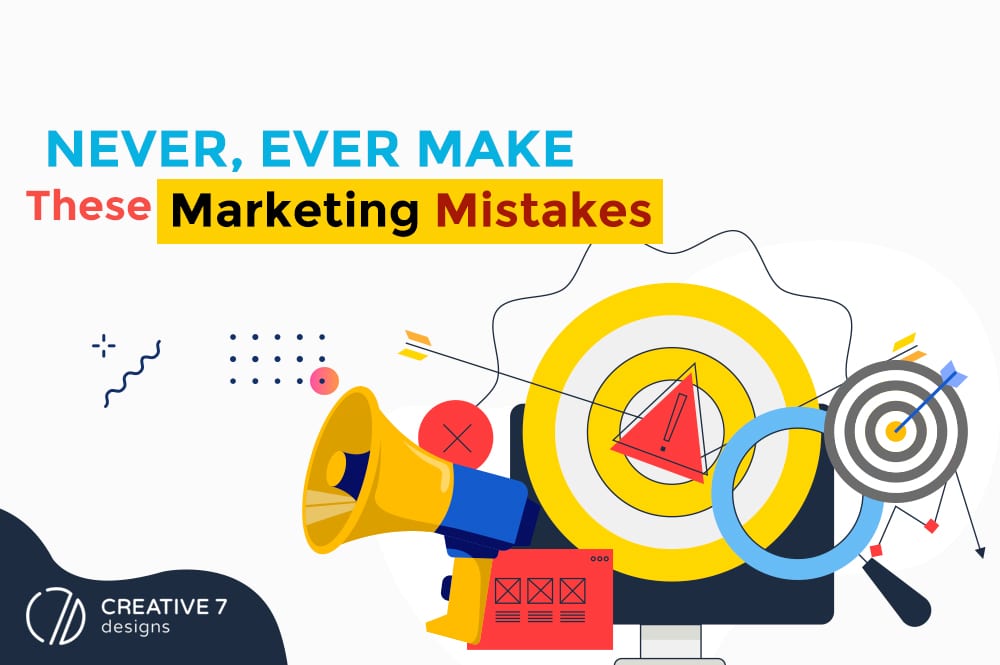Overview: Not tracking results? Selling an “unproven” product or service? Small businesses, learn these 5 common mistakes to help your business succeed.
 You’re already a small business — how much room do you have to make a mistake?! The answer is easy: Not much. With fewer employees, less annual revenue, and minimal resources in comparison to a corporation or regular-sized business, one mistake could literally cost an entire small business… itself.
You’re already a small business — how much room do you have to make a mistake?! The answer is easy: Not much. With fewer employees, less annual revenue, and minimal resources in comparison to a corporation or regular-sized business, one mistake could literally cost an entire small business… itself.
Thankfully, there are tons of experts giving tons of advice for small business marketers to gain success! And as a small business, we’ve either experienced some of these mistakes ourselves, or observed them with other small businesses.
Mistake no. 1: Not tracking your results.
If Forbes is saying you need to track your results as a small business owner… then you need to track your results. (We don’t question Forbes here.) Here’s why.
“If you don’t track, you really don’t know what works. Whether it’s not tracking goals on your website with Google Analytics, or not tracking conversions through your pay per click ads, or not tracking calls and foot traffic from a big sale or advertising investment, if you aren’t tracking, you’re throwing your money away. […] If you’re not tracking, there’s no way to learn from your mistakes. Heck, there’s no way to even know if you made a mistake. […] Worst of all, if you don’t track, then there’s really no way to improve. That is truly a waste of a marketing budget.”
Mistake no. 2: You are trying to reach the wrong audience.
This can completely destroy otherwise good marketing and an otherwise good business. Some business owners have such a clear, focused view of who they want their customers or clients to be that they can be completely blinded to the customers they actually have.
Here’s an example: Someone opens a sandwich and coffee shop. They think their ideal customers will be soccer moms and hipsters. Yet day after day, more than half their tables are filled up with retired guys hungry after playing golf on the nearby course. The other tables are empty.
Yet the owner barely sees the guys. He keeps promoting gluten-free muffins and green smoothies. The guys just want a really good sandwich, a beer or two and a relaxed place to cool off before they go home. They don’t want gluten free muffins.
This kind of mismatch can happen in a number of ways. It can be around a feature of a product. The owner thinks people are buying their product for reason A, yet people are really buying it because of reason B. Unfortunately, all the company’s marketing is built around reason A. That mistake, that misread of their audience, is costing them an uncounted amount of sales.
Related article(s): The 10 Most Common Small Business Marketing Mistakes
Mistake no. 3: Selling an unproven product.
So, you have a great idea — that’s great! Maybe it’s something that’s never been done before. Or maybe it’s about adopting a business you saw to another demographic or country. Or maybe you want to try to monetize your expensive hobby. Whatever it is, before you start printing business cards and telling your family that you are now an entrepreneur, there are two things you need to consider (and thoroughly calculate):
Do people want this product?
Do people want to pay for this product?
You might think something is a great idea, but that doesn’t mean other people will think it is. And even if other people do think it’s a great idea, that doesn’t mean they’ll want to pay for that idea.
One best practice to figure this out is to first build an audience. Produce content online to build your audience. You can use them to get information about what problems they have and how important a solution is to them. Then you can tweak or create a product or service to fit their needs.
You should also have an idea of how much the product is worth to them. At the beginning, don’t be afraid to try some different price points to see where the sweet spot is.
Related article(s): 21 Small Business Marketing Mistakes that Keep Your Company From Growing
Mistake no. 4: You’re splitting marketing activities across multiple providers.
You’ve got a logo designer, someone else putting together your website, and yet another person setting up your social media marketing campaigns. A business needs cohesion!
If nothing matches then you’ve actually costing yourself a bundle rather than sourcing individuals to “save money.” Because the reality is having different people with different styles tackle different aspects of marketing results in an uncoordinated mess. Ads ‘feel’ different than the website copy, email newsletter, or blog articles. And that’s because your “marketing team” isn’t really a team — just a different freelancers producing stuff in isolation from one another.
Do yourself a favor and look for a marketing agency that does everything under one roof. Is it more money? Yes, but that’s what comes with starting a business — allocating expenses to build your business the right way. Which leads us to the next point…
Related article(s): Top 10 Small Business Marketing Mistakes
Mistake no. 5: Not making marketing a priority.
The reason we’re tying this point into the previous point is because small business owners often don’t want to spend money on an actual marketing team. But how else do you plan to market your business?
This might sound surprising at first, but it starts to make sense when we consider that entrepreneurs, especially new ones, are worried about having the best quality products or services, assembling the best quality team, learning to delegate effectively, securing start-up funds, and planning a budget.
And just being aware that marketing is important is not enough to keep owners from falling into this trap. Justine Leconte is a fashion vlogger and entrepreneurial designer known for her ethically sourced fashion line and her brilliance at exploiting social media.
Leconte knows her exact target cusotmer and has a well-defined brand that appeals very strategically to those customers. But when it comes to effective marketing, Leconte admits that she was so focused on acquiring quality products that she missed many opportunities to get the word out about her new line. And this is with a professional background in — you guessed it — marketing.
Leconte herself says at least 50 percent of a business owner’s workload should be devoted to marketing, even if they are doing it themselves.
Related article(s): Marketing Mistakes Small Businesses Keep Making


